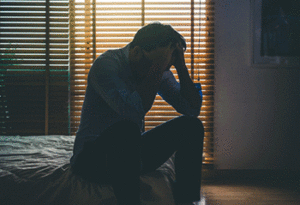Everyone feels some form of sadness from time to time; it’s a normal and even healthy part of life.
However, feeling sad is not the same thing as depression.
Depression is a mood-based mental health disorder that affects 350 million people worldwide, the symptoms of which include chronic:
- Hopelessness
- Sadness
- Numbness
- Sleep problems
- Food-related disorders
- Feelings of worthlessness
Unlike ordinary feelings of grief or emotional turmoil, depression is characterized by long periods of interference, which can sometimes last for months or even years, with no rational reasoning. Someone can have all the money and success in the world and still struggle with depression.
In the face of these often debilitating symptoms, it is unsurprising that many people would turn to drug abuse as a way to find relief. But are there any other connections between depression and drug abuse?
What Are Co-Occurring Disorders?
A co-occurring disorder is a medical term used to describe two different disorders that have become linked together in how they affect someone and cannot be effectively treated separately from each other. It is specifically used to denote the combination of a substance use disorder and one or more mental health disorders.
The classification of a co-occurring disorder is very broad, and involves a good deal of overlap, as many mental health disorders tend to be what is known as “comorbid.” This means that if someone is dealing with depression there is a good chance that they are also experiencing other mental health issues such as anxiety, Attention-deficit/ hyperactivity disorder (ADHD), or bipolar disorder.
Co-occurring disorders are quite common, roughly 1 in 4 adults in the United States who have a mental health disorder will also have a substance use disorder since addiction and mental health disorders are strongly linked in a variety of complex ways.
One of the ways that depression is extremely similar to addiction is that the risk factors for both include a mix of situational factors, brain chemistry, genetics, environment, and the presence of childhood trauma or other negative early experiences.
Can Depression Cause Drug Abuse?
As explained above, if someone already has depression, it puts them at a significantly higher risk for developing a substance use disorder as well. Depression does not automatically make someone more likely to start abusing drugs, but it can contribute to a vicious cycle of abuse and addiction.
Part of the issue is that many people do not seek out treatment for depression, whether this is due to shame, embarrassment, or a simple lack of resources and accessibility. Veterans, in particular, often feel pressured to hide symptoms of mental health disorders like depression.
What people end up doing instead is self-medicating with drugs. Part of the chemical makeup of depression is a lack of chemicals like dopamine and serotonin in the brain. Drugs like cocaine, heroin, and more, alters the levels of these chemicals, many drugs specifically creating spikes of dopamine.
This creates the learned behavior in those with depression that doing drugs makes them feel better, at least as long as the effects can hold back the symptoms of depression. And as someone grows more tolerant to those effects, they find themselves abusing drugs more frequently and in larger amounts, until they have become dependent and addicted.
The worst part is that, while in the beginning, it seems like drug use is helping relieve symptoms, it can actually make someone’s depression far worse than it was before. This is caused by a backlash known as “withdrawal depression” that manifests as extremely severe depressive periods that, unfortunately, are part of what creates the cycle of addiction, driving people back to using to find relief.
Alcohol's Effects on Depression
A depressed mood and drowning your sorrows in alcohol seem to be both culturally and statistically related. Movies and TV shows depict bars as havens for the depressed, lonely, and woebegone. However, treating depression with alcohol is a sure way to make things worse.
Some drugs will lift your mood and even though alcohol is a depressant, it doesn’t always feel that way when you’re three shots in at a party. The substance causes a release of inhibitions and makes you forget about your worries.

Drinking is also a social activity. Personal experience and media and advertorial portrayals can cause you to think of drinking as a mood-elevating activity.
But while you might feel euphoric after a few drinks, the chemical activity in your brain is making the neurochemical effects of depression worse.
Drinking isn’t only associated with depressive disorders, it’s also tied to suicide.
As your depression is deepened with a little bit of chemical help from alcohol, it also causes you to lose inhibitions that would normally stop you from self-harm and suppresses your judgment.
Can Drug Abuse Cause Depression?
The answer to whether engaging in chronic drug abuse can result in depression is a bit complicated. Drug abuse can and often does cause people to exhibit the symptoms associated with depression, but it cannot literally give someone the clinical mental health disorder.
Some of this confusion is caused by someone not realizing they are suffering from depression until they are checked in for addiction treatment and formally diagnosed during the initial evaluation.
Even if they were using drugs to self-medicate, they might not have understood exactly why, only that it made them feel better. Receiving a specific diagnosis for depression only after seeking treatment for drug abuse can lead to the incorrect assumption that the drug abuse caused the depression.
Another way that drug abuse is closely linked to depression but does not cause it is the way that addiction can mimic the symptoms of depression during the process of withdrawal. Some common effects of withdrawal from a variety of substances include feelings of depression, as well as:
- Lack of energy
- Insomnia
- Loss of appetite
- Aches and pains
- Difficulty concentrating
- Suicidal thoughts or behavior
- Mood swings and irritability
All of these symptoms are associated with depression as well. While mood-based withdrawal symptoms tend to linger the longest even after someone has completed detox, they will eventually go away on their own, which can make it seem like the drug abuse is what was causing the depression in the first place.
However, that being said, drug abuse can still indirectly cause strong feelings of depression in people based on the situations that long-term drug abuse tends to put people in.
So what does that mean? It means that long-term drug abuse generally leads to a marked increase in risky behavior, which can involve anything from needle-sharing and unprotected sex to driving under the influence or engaging in other illegal activities, all of which can have extremely negative outcomes and consequences that can result in intense feelings of depression.
Drug abuse can isolate you from your family and friends, cause you to neglect responsibilities like work or school, and lead to a mindset where you are incapable of enjoying the hobbies or activities that you used to. Understanding the effects that drug abuse is having on your life and wanting to quit but being unable to do so is enough to cause anyone to fall into a serious depression.
Post-Addiction Depression
Addiction doesn’t just worsen depression while you are actively using, it can also lead to long-lasting mental health consequences that can contribute to depressive disorders. Stimulants, in particular, are associated with depression during withdrawal symptoms. Meth is among the worst offenders. Excessive use of the drug, especially during meth binges, can damage dopamine receptors, which is part of the brain’s ability to feel pleasure. With fewer working receptors, you might not be able to feel pleasure from anything besides powerful sources like meth use. This often results in depression, and sometimes, suicide.
How Can I Get Treated For Depression And Drug Abuse?
Among adults in the United States with co-occurring disorders such as depression and substance use disorder, only about 12 percent of them actually receive proper treatment for both issues. One major reason for this is the significant negative stigma associated with both addiction and mental illness.
Other problems include the fact that despite comorbid disorders being so common, they are actually fairly difficult to accurately diagnose. As previously mentioned, depression can be a major influencer in initiating drug abuse, and drug abuse can also prompt feelings of depression as well as mimic different symptoms of the disorder, even if someone does not actually have clinical depression.
Why is it so important to be able to tell if someone was experiencing what could be clinically diagnosed as depression before they began abusing drugs? Because if that is the case, then it means that this person will need what is known as dual diagnosis treatment.
 Dual diagnosis treatment is a form of addiction recovery therapy meant to treat co-occurring disorders, including drug addiction and depression. Because it involves dealing with multiple issues at the same time, it is typically more involved, usually requiring some degree of medication-assisted treatment (MAT), and takes longer than a regular addiction rehabilitation treatment program.
Dual diagnosis treatment is a form of addiction recovery therapy meant to treat co-occurring disorders, including drug addiction and depression. Because it involves dealing with multiple issues at the same time, it is typically more involved, usually requiring some degree of medication-assisted treatment (MAT), and takes longer than a regular addiction rehabilitation treatment program.
Someone who began to suffer from depression as a result of the destructive cycle of addiction will generally not require the same level of care as someone who had depression before engaging in drug abuse.
This is that taking drug abuse out of the equation removes the cause of the person’s depression. Also, if they were displaying symptoms of depression due to the effects of drug abuse or withdrawal, these will eventually dissipate on their own after detox and a significant length of sobriety.
However, if someone was struggling with depression first, then treating just their addiction is only half the battle. Even after completing an addiction recovery program, they will still have depression and are much more likely to relapse in attempting to cope or self-medicate.
The only way to effectively treat either disorder is to treat them both at the same time, through dual-diagnosis therapy. Not every addiction recovery treatment center is going to offer or be properly equipped to provide dual diagnosis treatment, so if you are struggling with both depression and drug abuse, that should be at the top of your list of questions to ask potential treatment centers.
Are You Struggling With A Co-Occurring Disorder? We Can Help
Battling a substance use disorder can be intimidating enough without also having to factor in a co-occurring mental health disorder, especially one like depression, which can make the whole situation feel hopeless and outside of your control.
But the truth is that it’s never a hopeless fight, and you don’t have to do it alone. Delphi Behavioral Health Group will work with you to do whatever it takes to help find the resources, help, and treatment to get out from under addiction and take back your life.
If you or someone you care about is struggling with addiction and depression, our admissions specialists are on-call 24/7 to help you find a facility that offers experienced, evidence-based dual diagnosis treatment. They can also help navigate verifying your insurance, and answer any questions you might have.
The following organizations provide free resources about depression and how to seek treatment:
- National Alliance on Mental Illness (NAMI): 1-800-950-NAMI
- National Institute of Mental Health: 1-866-615-6464
- Anxiety and Depression Association of America: 1-240-485-1001
- American Psychological Association: 1-800-374-2721
- American Psychiatric Association: 1-703-907-7300
- Center for Disease Control and Prevention Division of Mental Health: 1-800-CDC-INFO
